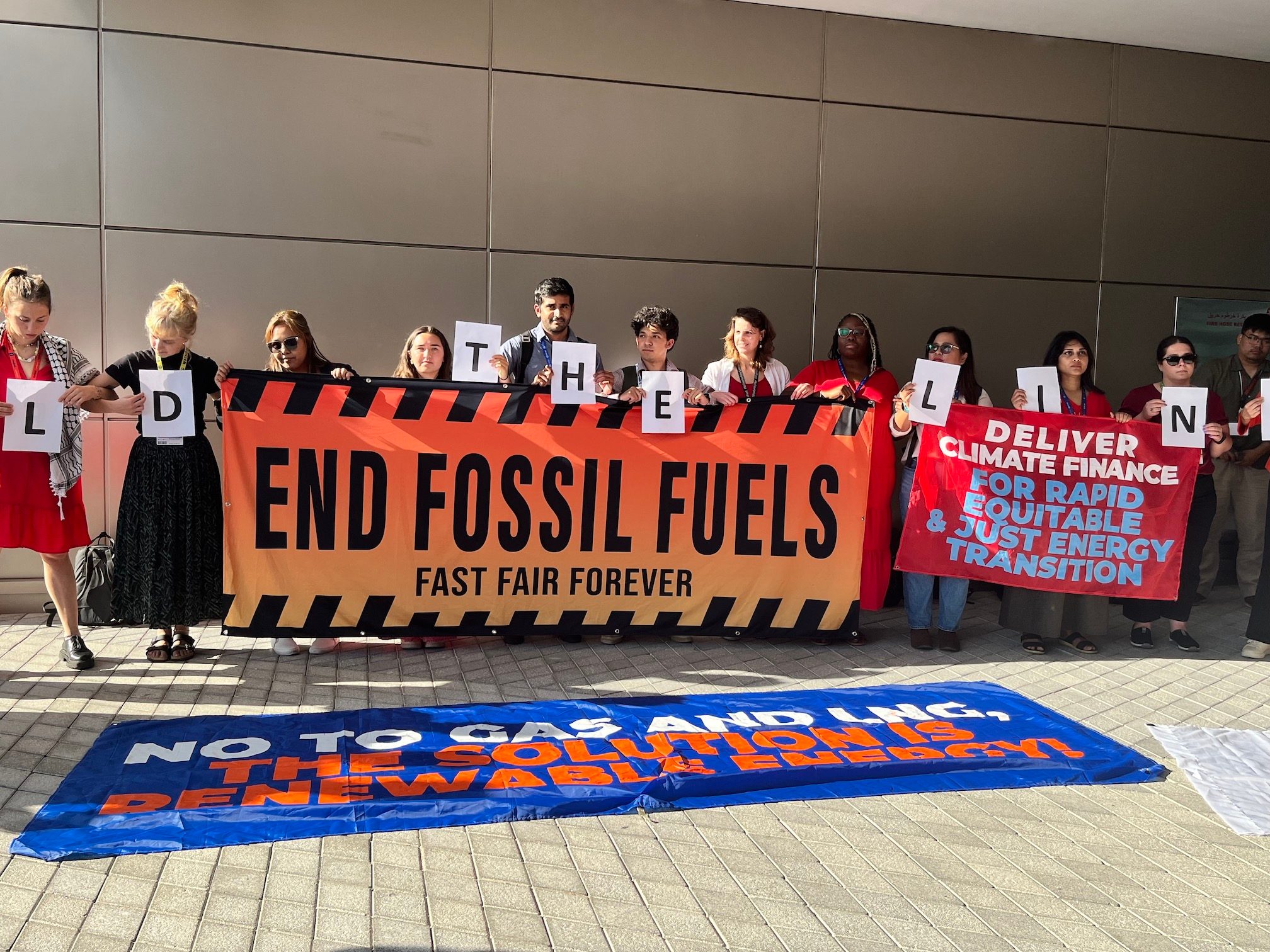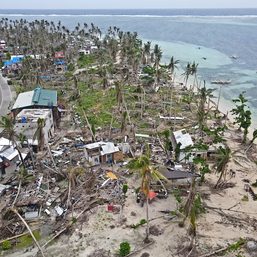SUMMARY
This is AI generated summarization, which may have errors. For context, always refer to the full article.

MANILA, Philippines – As the United Nations Climate Change Conference in Dubai nears its end, several civil society organizations from the Philippines and the region closely following the talks lamented the weak language on fossil fuels and the “refusal” of countries to deliver on climate finance.
During a Global Campaign to Demand Climate Justice press conference on Tuesday, December 12 – the supposed last day of COP28 – Filipino climate activist Lidy Nacpil did not mince words as she talked about the negotiations, now entering their most crucial hours after two weeks.
“I wish we could say that we just failed to make progress, but it’s actually even worse than that. On many counts in this process, COP28, we’ve actually gone backwards. On the issue of fossil fuels, the language which is in the current text is worse than what we had in the last two COPs,” Nacpil, the coordinator of the Asian Peoples’ Movement on Debt and Development, said during the press conference in Dubai.
While the last two COPs or Conference of Parties to the UN Framework Convention on Climate Change committed to the “phasedown of unabated coal power and phaseout of inefficient fossil fuel subsidies,” the COP28 draft did not refer to a “phaseout” of fossil fuels. Instead, it listed eight options that countries could use to cut emissions.
“We understand the geopolitical and political economy dynamics in these negotiations are complicated, hence the resulting text on fossil fuels,” Nacpil said.
“But it cannot be discounted that if there is one linchpin problem, it is the fact of the refusal to deliver or even talk about the delivery of climate finance, which makes the entire fossil fuel phaseout important for us in the sense of making sure it’s equitable and just.”
According to Nacpil, talking about a fossil fuel phaseout without talking about climate finance is “just a sham.”
“And the way that the US and other developed countries are styling themselves as climate champions makes us sick when we hear them. Because it is so hypocritical that they’re actually expanding their fossil fuel production and consumption, and it’s so shameless that they’re calling for ambition without talking about the delivery of their obligations to provide finance,” she added.
The United States and the European Union were among countries who called for the strengthening of the draft agreement.
A couple of groups present in Dubai even sent the Philippine delegation their proposed revisions to the draft global stocktake text in hopes that the delegation would guard against weakened language on fossil fuels. (READ: Can the Philippines be a strong voice again at UN climate talks?)
The global stocktake – a process for governments and other stakeholders to track and evaluate their progress toward meeting the goals of the Paris Agreement – is meant to inform countries’ next round of climate action plans, called Nationally Determined Contributions.
Church leaders in the Philippines joined the call for a strong decision against fossil fuels at COP28.
“Thousands of us came to COP28 with the hope that it will deliver the climate action we all so desperately seek. Our young people and vulnerable communities bravely spoke up too,” said Bishop Gerry Alminaza, chair of the Catholic Bishops’ Conference of the Philippines’ National Laudato Si’ Program.
He added: “But the latest global stocktake is crushing that hope. Our global leaders have the moral duty to use the remaining hours of this climate conference to deliver action compatible with 1.5°C, and herald a full and equitable phaseout of all fossil fuels.”
Father Edwin Gariguez, the lead convenor of the Protect the Verde Island Passage network, said the latest global stocktake text “positions itself as an enemy of biodiversity.”
“No inclusion of phaseout implies its blatant support for fossil fuel expansion and destruction of vital biodiversity areas affected by gas developments, such as the Verde Island Passage,” Gariguez said as he warned against the danger that coasts and communities like those in Batangas face.
The province, part of which lies along the Verde Island Passage, has become a preferred area for many liquefied natural gas projects in the Philippines
“Fossil fuel does not have a place in our worsening climate. The retention of fossil fuels as a transitional fuel towards cleaner energy is clearly a counterintuitive solution to address our climate crisis,” Gariguez added.
During Tuesday’s press conference, Nacpil said there have been small victories at COP28, like the adoption of the loss and damage fund on the first day and “some positive points in the just transition package,” but both issues still boil down to the delivery of climate finance.
“This is a dark day. We probably are not very surprised because we’ve seen how the trends were going even before we reached Dubai, then in Dubai,” Nacpil said.
She added: “You know when you know it’s going to come and then it comes? And you’re still as shocked and as enraged even if you knew this was coming? This is how we feel today.” – with a report from Reuters/Rappler.com
This story was produced as part of the 2023 Climate Change Media Partnership, a journalism fellowship organized by Internews’ Earth Journalism Network and the Stanley Center for Peace and Security.
Add a comment
How does this make you feel?









![[OPINION] Grading Marcos admin’s performance on the climate agenda](https://www.rappler.com/tachyon/2024/06/grading-marcos-performance-climate-agenda-june-25-2025.jpg?resize=257%2C257&crop=441px%2C0px%2C1080px%2C1080px)
![[OPINION] No room for ‘business as usual’ in era of climate emergency](https://www.rappler.com/tachyon/2024/06/no-room-business-as-usual-climate-change-june-25-2024.jpg?resize=257%2C257&crop_strategy=attention)
![[OPINION] Climate finance: A call to action for the Philippines](https://www.rappler.com/tachyon/2024/05/tl-climate-finance.jpg?resize=257%2C257&crop=458px%2C0px%2C1080px%2C1080px)







There are no comments yet. Add your comment to start the conversation.